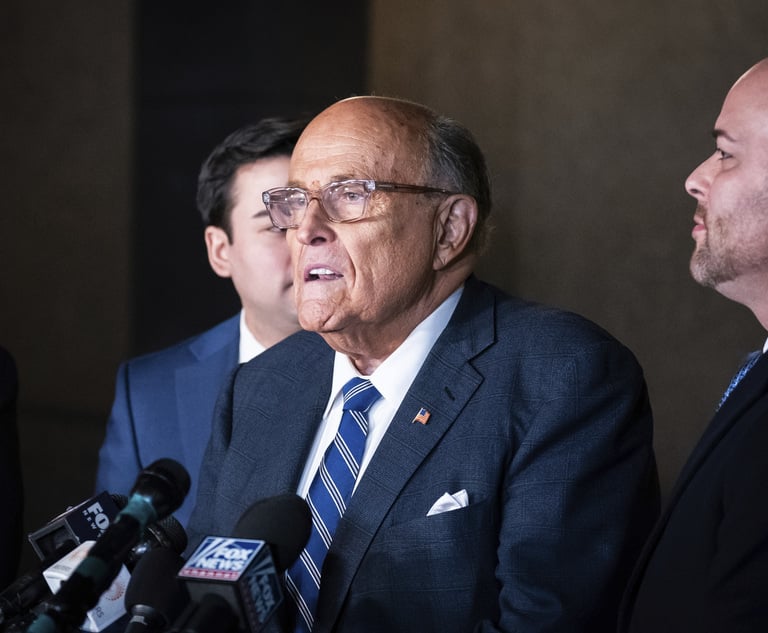 Photo: Suphakant/Adobe Stock
Photo: Suphakant/Adobe StockExamining New York Court Decisions on Website Accessibility Claims
In New York, federal courts have dismissed cases for failure to meet all elements of a Title III Americans with Disabilities Act (ADA) claim, specifically “that defendants own, lease, or operate a place of public accommodation,” and for lack of subject matter jurisdiction. New York State courts dismissed cases due to plaintiffs’ inability to prove all elements of a disparate impact or disparate treatment claim.
December 13, 2024 at 09:00 AM
8 minute read
New York has witnessed a significant increase in website accessibility lawsuits at both the federal and state levels. Recent developments in case law could change the landscape regarding how public accommodations—businesses offering goods and services to the general public—litigate these cases. In New York, federal courts have dismissed cases for failure to meet all elements of a Title III Americans with Disabilities Act (ADA) claim, specifically “that defendants own, lease, or operate a place of public accommodation,” and for lack of subject matter jurisdiction. New York State courts dismissed cases due to plaintiffs’ inability to prove all elements of a disparate impact or disparate treatment claim. These defenses can serve as a vital tool for defendants of such claims when navigating this evolving area of law.
In a recent lawsuit filed in the Southern District of New York, AI use in website remediation came into question. Plaintiffs filed a lawsuit against accessiBe, a company that markets a widget/overlay that uses artificial intelligence to allegedly repair the underlying code of websites to comply with the World Wide Web Consortium’s Web Content Accessibility Guidelines (WCAG). In the accessiBe lawsuit, plaintiffs allege, inter alia, that accessiBe engaged in “misleading and false representations in its advertising, its direct marketing, its standard form correspondence with customers, and in its terms of service regarding its ‘overlay’ products.” See Parikh v. Accessibe, 24-cv-4848. AccessiBe sought leave to file a motion to dismiss, which will likely be briefed in 2025. It remains to be seen whether this lawsuit will have any impact concerning the way public accommodations choose to remediate websites, but the case serves as another example of nuanced website accessibility matters popping up in court.
NOT FOR REPRINT
© 2025 ALM Global, LLC, All Rights Reserved. Request academic re-use from www.copyright.com. All other uses, submit a request to [email protected]. For more information visit Asset & Logo Licensing.
You Might Like
View All
Rudy Giuliani Settles NY Enforcement Action With Ga. Poll Workers

Blake Lively’s Case Highlights How Pre-Litigation Subpoenas Can Expose Harassment in Hollywood
5 minute read
Drake Sues UMG for Defamation Over Promotion of False Claims of Pedophilia

Oil Co. Alleges Plot to Drive Away Competition in NYC's Liquid Fuel Market
3 minute readTrending Stories
- 1Reviewing Judge Merchan's Unconditional Discharge
- 2With New Civil Jury Selection Rule, Litigants Should Carefully Weigh Waiver Risks
- 3Young Lawyers Become Old(er) Lawyers
- 4Caught In the In Between: A Legal Roadmap for the Sandwich Generation
- 5Top 10 Developments, Lessons, and Reminders of 2024
Who Got The Work
J. Brugh Lower of Gibbons has entered an appearance for industrial equipment supplier Devco Corporation in a pending trademark infringement lawsuit. The suit, accusing the defendant of selling knock-off Graco products, was filed Dec. 18 in New Jersey District Court by Rivkin Radler on behalf of Graco Inc. and Graco Minnesota. The case, assigned to U.S. District Judge Zahid N. Quraishi, is 3:24-cv-11294, Graco Inc. et al v. Devco Corporation.
Who Got The Work
Rebecca Maller-Stein and Kent A. Yalowitz of Arnold & Porter Kaye Scholer have entered their appearances for Hanaco Venture Capital and its executives, Lior Prosor and David Frankel, in a pending securities lawsuit. The action, filed on Dec. 24 in New York Southern District Court by Zell, Aron & Co. on behalf of Goldeneye Advisors, accuses the defendants of negligently and fraudulently managing the plaintiff's $1 million investment. The case, assigned to U.S. District Judge Vernon S. Broderick, is 1:24-cv-09918, Goldeneye Advisors, LLC v. Hanaco Venture Capital, Ltd. et al.
Who Got The Work
Attorneys from A&O Shearman has stepped in as defense counsel for Toronto-Dominion Bank and other defendants in a pending securities class action. The suit, filed Dec. 11 in New York Southern District Court by Bleichmar Fonti & Auld, accuses the defendants of concealing the bank's 'pervasive' deficiencies in regards to its compliance with the Bank Secrecy Act and the quality of its anti-money laundering controls. The case, assigned to U.S. District Judge Arun Subramanian, is 1:24-cv-09445, Gonzalez v. The Toronto-Dominion Bank et al.
Who Got The Work
Crown Castle International, a Pennsylvania company providing shared communications infrastructure, has turned to Luke D. Wolf of Gordon Rees Scully Mansukhani to fend off a pending breach-of-contract lawsuit. The court action, filed Nov. 25 in Michigan Eastern District Court by Hooper Hathaway PC on behalf of The Town Residences LLC, accuses Crown Castle of failing to transfer approximately $30,000 in utility payments from T-Mobile in breach of a roof-top lease and assignment agreement. The case, assigned to U.S. District Judge Susan K. Declercq, is 2:24-cv-13131, The Town Residences LLC v. T-Mobile US, Inc. et al.
Who Got The Work
Wilfred P. Coronato and Daniel M. Schwartz of McCarter & English have stepped in as defense counsel to Electrolux Home Products Inc. in a pending product liability lawsuit. The court action, filed Nov. 26 in New York Eastern District Court by Poulos Lopiccolo PC and Nagel Rice LLP on behalf of David Stern, alleges that the defendant's refrigerators’ drawers and shelving repeatedly break and fall apart within months after purchase. The case, assigned to U.S. District Judge Joan M. Azrack, is 2:24-cv-08204, Stern v. Electrolux Home Products, Inc.
Featured Firms
Law Offices of Gary Martin Hays & Associates, P.C.
(470) 294-1674
Law Offices of Mark E. Salomone
(857) 444-6468
Smith & Hassler
(713) 739-1250






